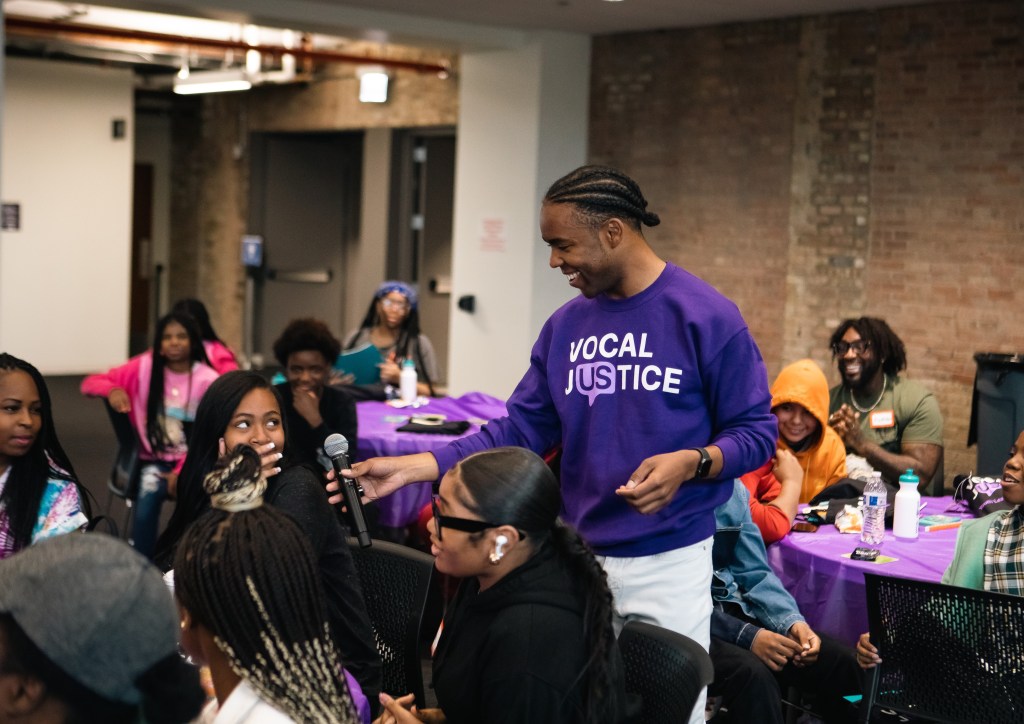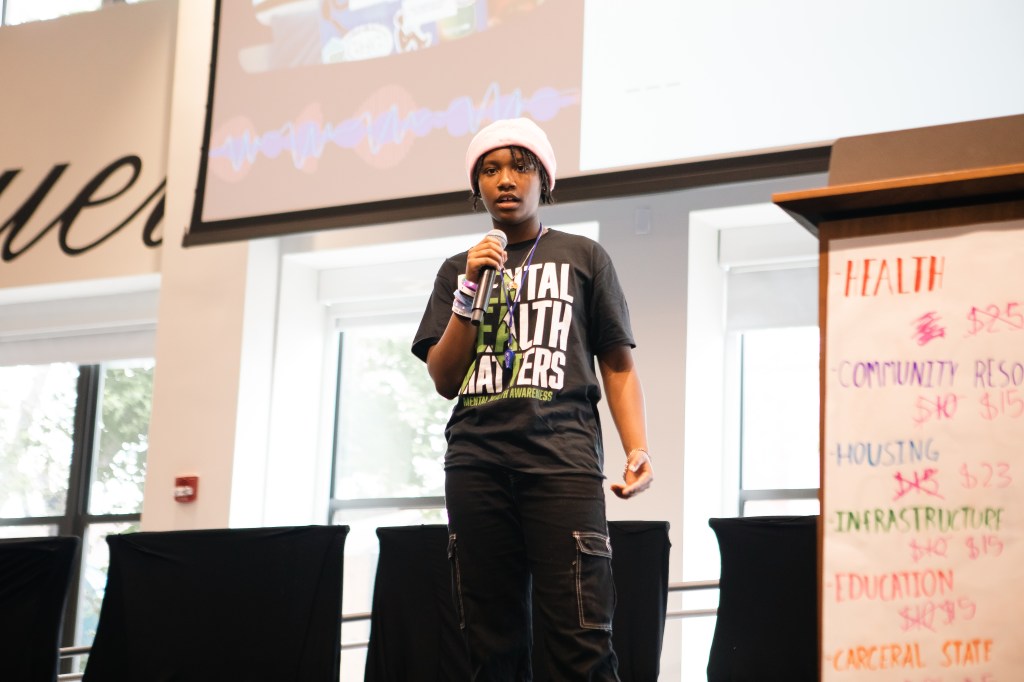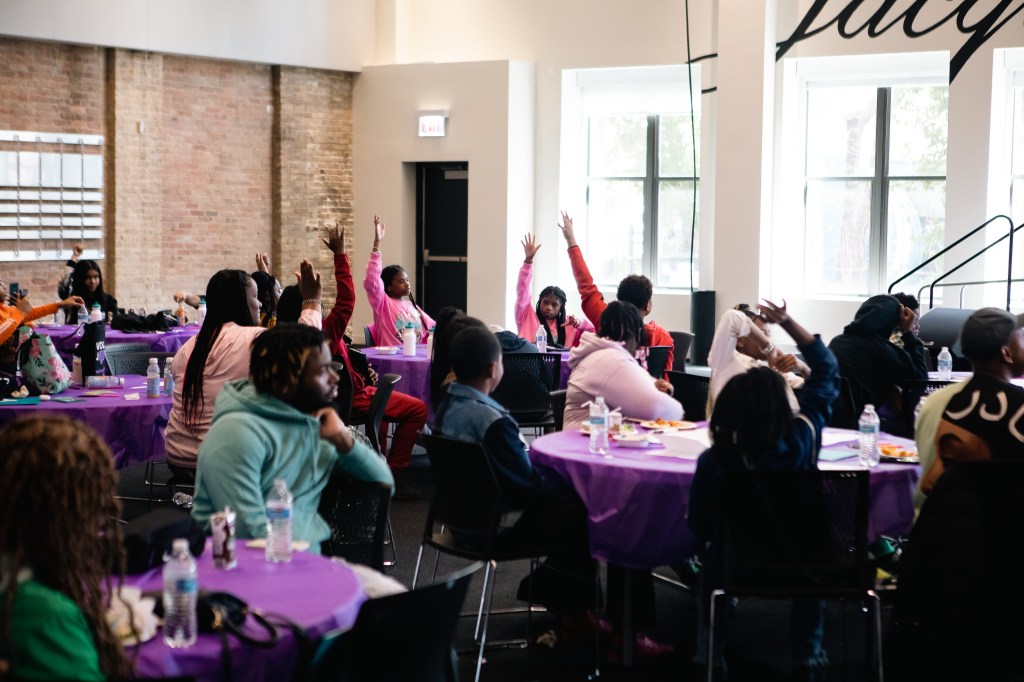Preparing Youth to Be Leaders of Social Change With Vocal Justice
By Christiaan Vorkink, August 23, 2024

Vocal Justice Founder and Executive Director Shawon Jackson remembers his first experience with public speaking: “When I was six my principal called me into her office. I was quite worried, thinking I did something wrong.”
But he hadn’t. Instead, the principal asked if he would read a poem as part of a celebration at a local community college in honor of Dr. Martin Luther King, Jr. “Speaking in front of hundreds of people helped me to feel confident in my voice as a young Black boy,” he added.
It was a formative experience for Shawon, who says he grew up as “a public speaking nerd.” From the MLK celebration, to speeches at his church, to competing with his high school’s speech and debate team, Shawon commented: “Public speaking activities helped me build confidence in my voice and my capacity as a leader.”
Shawon didn’t realize his words would carry him this far. In high school, he won speech competitions, which brought him both pride and embarrassment. “I argued against race-based affirmative action, failing to recognize why racial diversity mattered. My views shifted significantly when I got to college thanks to professors who plainly explained how racism still operates in insidious and implicit ways. I realized that while speaking up is powerful, it’s also important to have an education that prepares you to speak up for issues that matter.”
In college Shawon co-led a public speaking course at a youth correctional center. “One of my students, a young Black man, looked at me and said, ‘I don’t have a story to tell,’ which absolutely broke my heart.”
Shawon recounted that this young man was someone who had been through and seen the worst of the world — and who had proximate insights that needed to be heard. Unfortunately, in a world that elevates some voices over others, the young man didn’t think his voice mattered. “I wanted to change that,” Shawon continued.
Later, Shawon taught public speaking in the Dominican Republic and Washington, D.C., largely to youth of color. He saw how much his students were affected by the realization that their voices had power and wanted to continue that work, not just helping his students to use their voices but adding a social justice component to what they were learning. “I became fascinated with the idea of helping young people simultaneously build their communication skills and critical consciousness, or awareness of social inequities, in community with other young people.”
That’s the origin story of Vocal Justice, Shawon’s non-profit that inspires and prepares youth to create social change using tools including public speaking and storytelling.
“My goal was to ensure that young people felt confident in their voice and compelled to use it to address the injustices they’ve faced firsthand. I deeply believe that young people, particularly Black and Brown youth, can become leaders for social change.”


Proof of the results of the program can be found in the Vocal Justice Youth Advisory Board, which centers youth participants and makes them an important force in the organization’s decision making.
Young leaders also serve on Vocal Justice’s board of directors – which is unusual, even among peer organizations serving young people. “Youth representation on our board allows us to practice intergenerational decision-making,” Shawon said. “We intentionally have individuals across multiple age groups on our board, as there is wisdom across all generations that can and should shape the work we do. Uniting people who come from different backgrounds, while holding a shared purpose, results in stronger outcomes for Vocal Justice participants.
Vocal Justice offers its programs to middle and high school students. “The middle and high school years are some of the most formative years of our lives,” Shawon explained. “This is when young people start to develop a sense of their identity. The earlier we can introduce young people to our work, the more likely they are to become civically engaged in the long run.”
As Jaylen Wright, co-chair of the Youth Advisory Board, recently wrote: “Looking back, I was, at best, a below-average student and could have been a better athlete. When I took Vocal Justice in my sophomore year, the curriculum helped me gain more perspective and opened my eyes to what’s going on around me. Throughout the last year, thanks to the support of Vocal Justice and their belief in me, I have been able to venture out and do things in my career field of sports business, including being a captain at sampling events with Dr. Pepper and presenting and winning a competition on NIL (name, image, and likeness) deals! I’ve grown so much in the last two years and I can’t wait to see what the future brings for me next year and many more to come.”
Vocal Justice has expanded its programming from public speaking to storytelling more broadly. “It’s been beautiful to witness this evolution of our work over the years,” Shawon said. And, at True, we can’t wait to see the goodness that Shawon, his team, and the entire Vocal Justice community bring into a world where the need for tools to help young people advocate for social justice has never been greater.
We’re proud to support Shawon and Vocal Justice through TrueVentures.org, our social impact initiative supported by the True team. Vocal Justice is accepting applications for its Teacher Fellowship program. Find details here.

